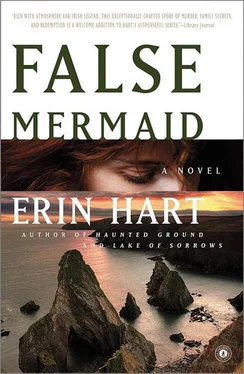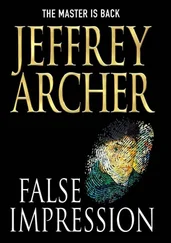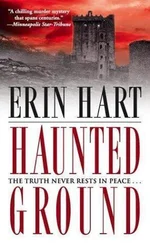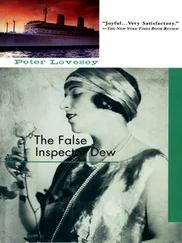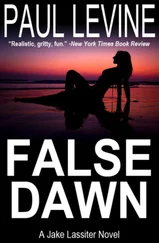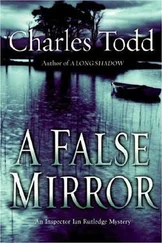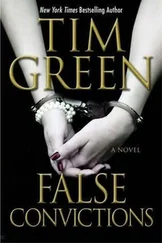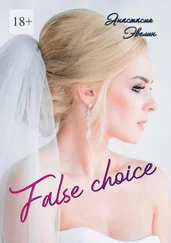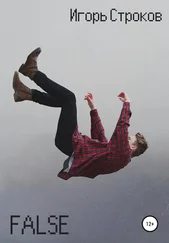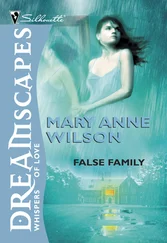“What stopped her?”
“I don’t know. All I know is what she said to me on the phone that night—”
“What did she say, Nora?”
“What I told you once before, that Peter seemed to get some strange pleasure from hurting her. I thought he was hitting her, but it turned out to be far worse than that. And—”
Cormac took her face between his hands. “Tell me, Nora, please.”
“She said that she had done things, too, unspeakable things—that she had lied and deceived everyone. That she had to find out the truth. The last thing she said was: ‘Isn’t it shocking, what you’ll do when you love someone?’”
“Oh, Nora—”
“She doubted herself more than she doubted him. That’s what drove her to the woods that night. It wasn’t the truth about Peter she was looking for, it was the truth about herself. She truly loved him, and he used that to destroy her. He goes on destroying her, in the eyes of her child, the eyes of the world. I can’t let him do it any longer. I won’t.”
“You’ve been carrying this alone, all these years?”
“Only one other person in the world ever knew as much as I’ve just told you.”
“Frank Cordova.”
“He was the only person who took me seriously—do you have any idea what it’s like, to be undermined and disbelieved for so many years? What it means to have one person stand by you? I didn’t mean for it to happen, that night with Frank. It was before I met you, Cormac. I just couldn’t go on—”
Cormac moved closer, but she pushed him away again. “Do you understand? I can’t—what we’ve had these past few months—I don’t deserve it, any of it. I should have listened to Tríona, I should have seen—”
But he moved in again, slowly, gently, folding her body into his. After a few moments, she stopped resisting and her head dropped forward, finally coming to rest against his chest.
Out beyond the harbor at Port na Rón, Ferghal O’Gara hit the switch to reel his nets in for the night. Another pitiful catch. He’d have to give it up, if things didn’t improve. But what would he do? Fishing was all he knew—the tides and banks, maneuvering a boat through rough seas, running the nets, negotiating a price for his catch—but it was all going by the wayside, with the corporate crowd taking everything over.
Ferghal didn’t allow himself to trust anything that operated on such a colossal scale. It was madness. Because when disasters came—for they had always come and always would—those disasters were on a colossal scale as well. All he wanted was to bring home enough to feed the children. Was that so much to ask? And maybe enough for the odd pint once in a while.
Once the nets were in, and the catch (what little there was) safely stowed, he started up the diesel engine and began motoring back to port. The moon was high and bright, and as he passed by the harbor at Port na Rón, he could see a disturbance in the water. Seals, dozens of them, calling out and splashing in the bay. What could have set them off? He’d never heard of killer whales hunting at night.
Ferghal cut his engine and stepped out onto the foredeck, listening to the eerie wailing, and remembering a story his grandfather had told him, about a group of men, a hundred years ago or more, out hunting seals in the caves below Port na Rón. One of the men had raised up his club to strike a pup when he heard the mother cry out in Irish: Mo pháistín, mo pháistín! My child, my child!
Ferghal himself was well used to the creatures—he’d practically been reared with them, always swimming around the boat looking for any fish that might escape his nets. He had to admit there was something about them, the way they looked up at you from the water, that expression in their eyes saying they knew and shared your deepest sorrows.
All at once, the sound of a single voice rose above the others.
Oro, mo pháistín! Oroo!
It carried like the voices of the old women he’d once heard at a wake, with their strange prayers and incantations. There was no more. He strained to listen, but the noise of the water and the wind in his ears made it impossible to tell if what he had heard was true, or only his imagination.
The boat heeled suddenly, as the broad back of a killer whale breached the water on his starboard side. Ferghal grasped the gunwale and scrambled to keep from falling back against the wheelhouse. As the huge predator glided by, he almost felt that if he could only reach out far enough, his fingers might brush against the creature’s high dorsal fin. But the whale moved on, and as it dived and disappeared, the white underside of its tail glowed briefly in the moonlight. The seals had fallen silent.
Ferghal shivered and switched the diesel engine back on. He’d have a mug of strong tea when he got home tonight, maybe a drop of something stronger. Then he’d go to bed, have a tumble with the wife, if he were lucky and she were willing. And he would never, ever tell anyone what he had seen and heard out here tonight, in case they would say he was mad.
Frank Cordova sat at his desk, trying to piece together all he knew about Miranda Staunton. She’d been spotted following Tríona Hallett around Lowertown, and if Truman Stark was telling the truth, she knew about the parking ramp security system. All the work they’d done to try to nail Peter Hallett, and now everything was beginning to point away from him and toward Miranda.
Frank glanced at his watch. Already after four, and he had to be down at the funeral home by six for a private family viewing before his brother’s wake. The phone at his elbow rang, and he picked up. “Cordova here.”
“Okay, here’s the lowdown on all those clothes you asked me to check.” Frank could heard Jackie Smart sorting through papers as she spoke. “The blood on the U of M tee shirt and shorts matched your vic from Hidden Falls, Natalie Russo. I got some wearer DNA from the inside as well, but the sample was pretty cross-contaminated—”
“Which means?”
“Just that more than one person seems to have worn them. At least one male, one female. Don’t ask me why. Still working on those profiles.”
So even though Tríona had possession of clothes worn by the person who likely killed Natalie Russo, they couldn’t prove she had worn them. They also couldn’t prove that she hadn’t. What mystery man would have worn Tríona Hallett’s clothes?
Jackie continued: “The DNA on your hit-and-run was pretty interesting, too. The newer bloodstains on the Galliard sweatshirt were a match to the accident victim, Harry Shaughnessy—no surprise there. The older stains were pretty degraded, but with amplification I was able to get a match to your cold-case vic—Tríona Hallett.”
Frank felt a flare of emotion. “That’s great, Jackie. I appreciate you turning everything around so fast—”
“I haven’t even come to the interesting part yet—the third DNA profile from inside the sweatshirt.” She shifted more papers. “I got Harry Shaughnessy’s DNA from the collar and cuffs—probably the only areas that ever made contact with his skin. But I got additional wearer DNA from inside the shirt. No hits against any forensic profiles or convicted offenders in the system. All I can say for sure at this point is that the other person who wore the clothes was female.”
“Female?”
“Yup. The fancy running shoes were the same; blood on the outside was a match to the same cold-case vic, Tríona Hallett. And inside, the same unknown female who wore the shirt.”
Cordova sank down into his chair. Peter Hallett was slipping away from them—again. “You’re absolutely positive it’s a female?”
“As positive as any forensic scientist will admit to being. Sorry if it’s not what you wanted to hear. Since we got no hits in the database, it’s going to be tough to find out who our mystery woman is—unless you have some idea.”
Читать дальше
